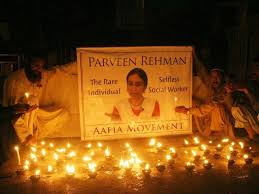
“Did you find that religious extremism has grown in Pakistan on this trip?” asked Sheema Kirmani, sitting cross-legged in the front of the crowd, after I had finished presenting my book at a session of the Karachi Literary Festival.
“Oh yes,” I responded. “But its not just religious, but also ethnic extremism that’s taken hold of Karachi. I think that the more violence permeates society, it causes individuals to fall back on the groups that give them a sense of identity.”
Sitting in the audience was Parveen Rehman. She had promised to attend after I went to her sister, Aquila Ismail’s presentation of her book “Martyrs and Marigolds,” a couple of hours before my launch.
During Aquila’s presentation, the moderator mentioned her family was also present in the audience, I turned to meet Parveen’s glance. She waved back to me enthusiastically, with that warm smile that I knew from back in the 80s, when I visited the Orangi Pilot Project to report for Dawn.
After her sister’s presentation, we went outside, where Parveen hugged me and we exchanged notes. “I thought you resembled Aquila,” I had said, as we parted… not knowing it was for the last time.
Barely a month later, March 13, Parveen was murdered at a roundabout in Orangi Town, Karachi. The administration has since claimed to have arrested her killer – a Tehrik-i-Taliban commander – whose party affiliates have ensconced themselves in this outskirt of Karachi, where Parveen worked for 25 years.
Unlike Malala – who rose to world fame – had the bullets missed Parveen, she might have become known to the world for her pioneering work for the voiceless poor.
There was no shortage of death threats for Parveen, who grew to become director of the OPP — begun by late Dr Akhter Hameed Khan. Amongst her pioneering work was to take a stand against land grabbing mafias – patronized by city officials.
Under Parveen, OPP compiled a report on 1500 Sindhi villages where the inhabitants were forcibly evicted by the land mafia – – and their land divided into plots for commercial usage. Although she shunned the limelight, Parveen took a clear stand against forced eviction of indigenous Sindhi and Baloch from their native villages and worked to enable them to acquire tenant rights.
The land grabber mafia even had an eye on the prized land on which OPP was built. Only a year ago armed gun men had burst into its building with the aim of occupying it.
Parveen told an interviewer that in order to save the building they engaged a “thug,” who scared off the occupants by threatening retaliatory fire.
Despite death threats, Parveen characteristically dismissed them, saying, “At the most what will they do. Kill me?”
And kill her they did.
In losing Parveen, the world has lost a courageous woman who fought for justice under the most difficult circumstances. The next government needs to pause and reflect on the tentacles being wrapped by land grabbing mafias on prized land in urban settings — where they will not stop even if it means killing an innocent woman like Parveen.

